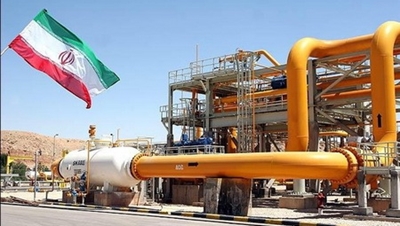10 Oil/Gas Fields Up for Development
Signature of contracts for the development of 10 oil and gas fields is a top priority of Irans Ministry of Petroleum. This issue was highlighted by senior Iranian officials at the closing ceremony of the third annual Congress of the Iran Petroleum and Energy Club (IPEC).

Signature of contracts for the development of 10 oil and gas fields is a top priority of Iran"s Ministry of Petroleum. This issue was highlighted by senior Iranian officials at the closing ceremony of the third annual Congress of the Iran Petroleum and Energy Club (IPEC).
Signature of contracts for the development of 10 oil and gas fields is a top priority of Iran"s Ministry of Petroleum. This issue was highlighted by senior Iranian officials at the closing ceremony of the third annual Congress of the Iran Petroleum and Energy Club (IPEC). Meanwhile, National Iranian Oil Company (NIOC) expects financing and win-win deal with foreign companies. Furthermore, Iranian exploration and production (E&P) companies were advised to reconsider their business models in preparation for cooperation with foreign companies.
Habibollah Bitaraf, Iran"s deputy minister of petroleum for engineering, research and technology, said in his report summarizing the two-day event that the Iranian Ministry of Petroleum would focus upon signing agreements to develop 10 oil and gas fields and enhance recovery rate from hydrocarbon fields in the current calendar year.
He also said that small-scale investment projects for enhanced recovery from oil fields were planned to be offered. Iran"s Minister of Petroleum Bijan Zangeneh had estimated the value of these projects at $5 billion.
Bitaraf said that Iranian companies would bid for these projects as future operators, adding that they could also cooperate with qualified international firms.
"This issue could play an effective role in diversifying contracts in effect, let alone motivating Iranian companies and creating jobs," he said.
Bitaraf said mid-stream activities like NGL projects were to be assigned to the private sector, adding: "This issue has been raised in light of field-oriented approach and investment in the National Iranian Oil Company (NIOC) while taking into consideration the portfolio of various projects."
He referred to Iranian E&P companies willing to form partnership with foreign companies under Iran Petroleum Contract (IPC) deals.
Bitaraf said these companies were advised to follow the paradigm of international companies and focus their activities on reservoir management, project management and financing as part of their plans to change their business model.
Diversification of methods of financing and applying new models were also discussed during the Congress.
For the first time in Iran"s petroleum industry, foreign currency-based bonds in Iranian currency are to be issued. Ali Kardor, CEO of NIOC, said that these bonds would enjoy NIOC"s sovereign guarantee in terms of risk hedging.
In his address, Bitaraf also underlined refining and production of petroleum products.
"Renovation and upgrading the complexity coefficient of existing refineries for the purpose of boosting the quality of products and enhancing output of higher value-added will be among the principled plans of the Ministry of Petroleum," he said.
Bitaraf said in light of plans for developing refineries in Iran, construction of new refineries would be economical only if petroleum products were to be exported.
In the petrochemical sector, the Ministry of Petroleum plans to develop this industry across Iran in cooperation with the Ministry of Industry, Mine and Trade.
$21bn Credit Line
Bitaraf ,in his wrap up speech, said during the forum ,issues such as financing, the high potentialities of financing in Iran, particularly in the oil and gas industry, and attraction of foreign investment were underlined.
He also referred to approaches and pieces of advice presented for attracting foreign investment by benefiting from the positive atmosphere created following the implementation of Iran"s landmark nuclear deal with six world powers, officially dubbed the Joint Comprehensive Plan of Action (JCPOA).
These approaches include economic and political stability, regulations for winning investor trust, establishment of investment fund in partnership with the government and private sector, risk hedging for foreign investors, designing a framework for the prioritization of projects and optimal use of resources, benefiting from international financial markets, restructuring the trade law, and effective supervision by banks on the consumption of financial resources borrowed from foreign companies.
Bitaraf said that agreements had been signed with South Korean, Chinese, Austrian and Danish banks for the allocation of more than $21 billion in credit.
He referred to the two sessions held on upstream oil sector, saying: "The NIOC expects foreign companies to provide financing and mull over win-win interaction so that the production targets would be achieved in the shortest possible time."
"These companies are expected to apply the state-of-the-art technologies for the development of oil fields" in Iran, he added.
Bitaraf also said that petrochemical industry enjoyed a certain position in the value and export of products.
He highlighted Iran"s advantage of access to diverse and abundant feedstock for petrochemical plants, saying: "The value and amount of petrochemical products must be enhanced after new projects have been implemented."
Oil Market Balance Delayed
Hojjatollah Ghanimifard, advisor to OPEC Secretary General, said at the closing ceremony that global markets had failed to re balance due to changes in the market fundamentals, particularly oversupply by the United States.
He, however, said that member states of the Organization of the Petroleum Exporting Countries had kept conforming to the OPEC and non-OPEC deal to cut output.
Ghanimifard cited OPEC forecasts for the global economic growth to reach 3.4% in 2018, down from 3.5% this year.
He said that demand for crude oil would increase by 1.4 mb/d next year, which would be very close to the current year"s demand.
Ghanimifard also said that non-OPEC oil supply would increase by 1 mb/d next year.
Courtesy of Iran Petroleum


comment